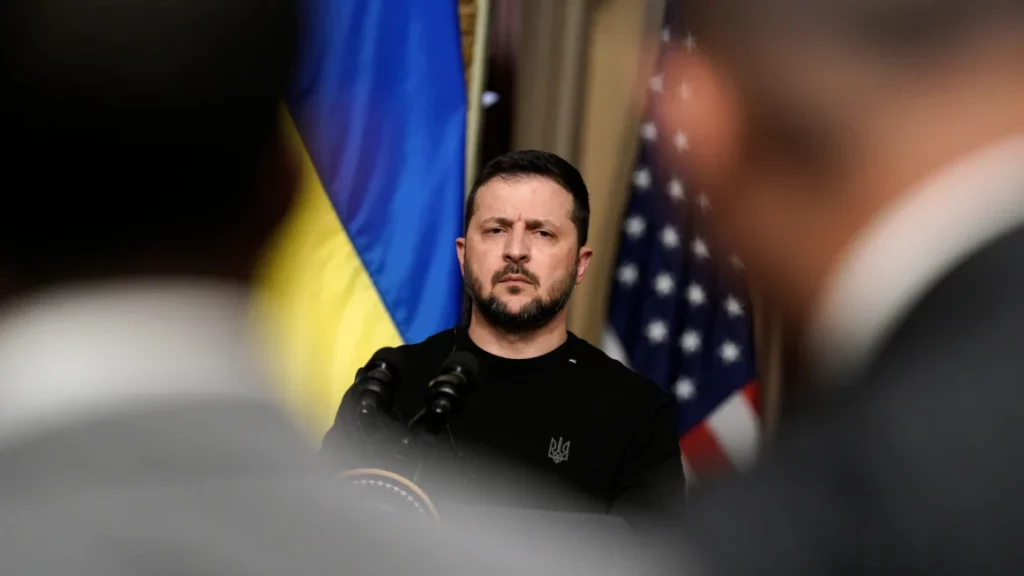
Ukraine is developing a “drowning not waving” problem. It is struggling to say clearly how badly the war is going.
Giving a candid public assessment of how poorly a conflict is going can be an unwise move as it can result in morale and support draining. After Obama boosted troops in Afghanistan, public support declined over the years, in part because of a lack of realism about how the war was going.
Ukraine’s acutely bad presentation of its troubles is mostly due to the myopia of its allies.
The lack of understanding in parts of US Congress is breathtaking. A congressman this week suggested Ukraine should name a finite price tag and a specific, simple goal. It’s staggering after two American wars of choice in two decades, costing trillions of dollars, that congressional memories are so short, and comprehension so limited.
Instead, Kyiv consistently points to past successes and future goals. They have reclaimed about half the territory Russia took last year; they have damaged its Black Sea presence strategically. They have a plan for 2024, Zelensky said, but it is secret.
Yet in truth, the most useful headline for Kyiv should be how unutterably bleak the frontlines are for them now. In nearly every direction, the news is grim. Russian forces are hiving off parts of the eastern city of Avdiivka, yet another town Moscow seems content to throw thousands of lives at despite its minimal importance. Along the Zaporizhzhia frontline, where the counteroffensive was focused but ultimately slow and unrewarding, Russian units have come back with renewed vigor and the defense is costly for Ukraine. Ukraine has made a plucky (or foolhardy) dash across the Dnipro River, with some small progress into Russian lines. The casualties have been immense, their supply lines are problematic, and their prospects dim.
Kyiv is now facing almost nightly cruise missile attacks, mostly held back by air defenses, Ukrainian officials say. So long as these protections continue, Ukraine might have a chance of entering spring with its infrastructure intact. But air defenses might be the first to be impacted, according to the Biden administration, when US money runs out.
Zelensky has had a truly abysmal week. His team trumpeted the symbolic victory of EU accession negotiations, and he called it a sign “history is made by those who don’t get tired of fighting for freedom.” But for actual EU membership the war has to end, and it has to end with Ukraine remaining a viable nation. Neither of these things are currently guaranteed.
Instead, Zelensky must put a brave face on two urgent funding disasters in four days. Hungary’s decision to veto $55bn in EU funding for Ukraine’s war efforts was met with assurances from EU officials that early January would likely see a unanimous, positive vote. But Viktor Orban – a right-wing populist with an inexplicable fondness for indicted war criminal Vladimir Putin – has opened the door to European disunity. The West’s cohesion up to this point was an outlier. The elections across Europe and vacillation ahead will likely hear greater demands for diplomacy and answers as to how the war ends.
Zelensky’s trip to Washington, and the heartfelt pleas it delivered, failed. Even if Washington manages to resume funding early next year, it has already damaged Ukraine. Stalling and political theater have made vital assistance – to defend the US’s European NATO allies from being dragged deeper into the worst land war in Europe since the 1940s – fair game for partisan horse-trading.
The Congressional debate was not about war policy in Ukraine, or Kyiv’s efficiency, or why the counteroffensive had failed. It was far shallower: a tit-for-tat trade on US border policy, coupled with unreasonable demands for Ukraine to predict the future course of the war. It is a jaw-dropping failure of American foreign policy the consequences of which will echo over the next decades. Not since Neville Chamberlain had a piece of paper in his hand, suggesting the Nazis could be negotiated with, has so much been at stake.
The bleak military picture for Ukraine was the case before Congress stalled US aid. Now the challenge ahead – the possibility Ukraine may face Russia without NATO backing – weighs on the minds of those who should be focused on the winter battles ahead.
“Without aid, we are finished”, one morose Ukrainian medic told me Thursday, after months of patching troops back together, and losing a colleague in the summer. Others troops manage to be more stoic, and insist they will fight on as they have no choice. But be in no doubt: No US or EU money – or just one of those failing – quite likely means most of Ukraine will fall under Russian occupation in the next two years.
That would put a belligerent, super-charged, revenge-hungry Russian military right on NATO’s borders, something which would immediately become Washington’s problem. Why? Because outside of the NATO treaty of mutual defense, on a purely practical level, secure and free democracies in Europe are key American trading partners and the bedrock of the US’s global heft.
Yet Zelensky faces an ally in the US so split and ignorant in part of its body politic, he must pretend things are not that bad. To admit Ukraine is struggling bolsters the argument there is no point funding a loser. If he says Ukraine is winning, then why does he need more help? If it is a stalemate, then surely that is not too bad after two years?
Some fringe Republicans insist Russia was always going to win, so why delay the inevitable by providing aid that gets Ukrainians killed? Those who want to say no to Ukraine need little excuse. But it delays the next, darker question, of when do you finally say ‘no’ to Moscow? How much of Ukraine, or maybe later its European neighbors, is it acceptable for Putin to subjugate or flatten? Does this question feel at all familiar?

